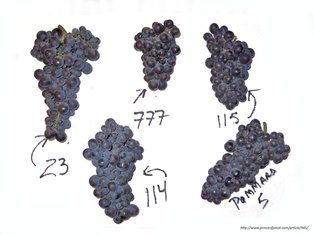A Sommelier's wine secrets
Menu
 I recently participated in a barrel tasting and noted something that was quite interesting All of the barrels contained wine made from Pinot noir grapes grown at the same vineyard site, cared for in the same manner and produced by the same winemaker, yet they had strikingly different characteristics. The only difference was the type of Pinot noir vine that produced the grapes. Pinot noir has a tendency to mutate easily, and over the years, subtle deviations from the original have demonstrated qualities that winemakers wanted to capture. The specific mutations have been duplicated by grafting, resulting in vines that are identical to each other (clones), yet subtly different from other Pinot noir vines, just the same as a violin, cello and viola are related and similar, yet not exactly the same. Winemakers and vineyards use these differences to their advantage and select specific clones to suit their tastes and environment. So when you get a bottle of Pinot noir, the wine may be produced from one single clone or a combination of several clones depending on the intention of the winemaker. What are the differences between these clones? There has been much discussion and speculation among winemakers and drinkers about the characteristics and attributes of certain clones. I’ve compiled a few notable characteristics of each clone, all of which are cultivated in Oregon.
Wädenswil Clone – This is the work horse of all the clones. It was cultivated for its reliability and heartiness. The grapes that come from these clones possess crisp acids, red fruit and a simple straight forward structure. The Teen Clones – Besides the fact that they tend to ignore the advice of their parent clones, these clones usually possess red fruit aromas and flavors and are lighter and brighter than the 667 or 777 clones. Clone #113 – The most elegant of the “teen” clones with prominent floral components, terrific texture and moderate tannins. Clone #114 – This particular clone also has rich aromas and good structure, but is primarily cultivated for its darker color and stronger tannins. Clone #115 – This is known as the “quality producer” since it possesses a deep purplish color, spicy aromas and notable long tannins which enable the wine to age. This particular clone can make a great wine on its own. The Sixes and Sevens- These clones produce darker and fleshier wines with flavors of black fruit. Clone #667 – This clone is known for its intense color, aromas, black sweet fruit and fine tannins. Clone #777 – Higher in quality and consistency than the other clones, 777 possesses denser and more complex notes of earth, black fruit, cassis, leather and tobacco. Pommard – Named for the famous region of Burgundy, this clone is known for its blue-black fruit, superior balance, complexity and intense color. It yields a more viscous wine with a richer mouth feel. So the next time you taste a glass of Pinot noir, chances are that you are enjoying the blending of an orchestral section more so than experiencing an individual instrument. |
Annette Solomon, CS
CategoriesArchives
December 2021
|

 RSS Feed
RSS Feed
